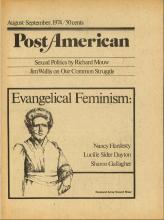I am a white male and my family roots are in the American middle-class. In fact, my historical background reveals that I am a white Anglo-Saxon Protestant in ethnic origins. In a very real sense, I am a son of the American dream. My upbringing, my educational and religious experiences, my peer groups, my class status -- all were preparing me, channeling me, to be among “the best and the brightest” of my generation. A line from a recent film struck me with very personal meaning: “Like the country he was part of, everything came too easily.”
You can imagine the internal contradictions and personal dilemma that emerged when the brutal facts of racism, poverty, and war intruded upon my consciousness and began to make cracks in my comfortable and secure worldview. Becoming sensitized to a new view of reality, a different picture of the world, was a deeply personal experience for me and others like me as we struggled to repudiate our past and join “the other side.” We began to recognize our own class, race, and nation as the oppressor while finding the oppressed to be poor, non-white, and outside of the American Way of Life. Thus, in the youthful stages of our rebellion, we tried to forget who we were and saw ourselves as defending the cause of the poor, the blacks, the Vietnamese.
Read the Full Article
To continue reading this article — and get full access to all our magazine content — subscribe now for as little as $4.95. Your subscription helps sustain our nonprofit journalism and allows us to pay authors for their terrific work! Thank you for your support.
Already a subscriber?
Login
